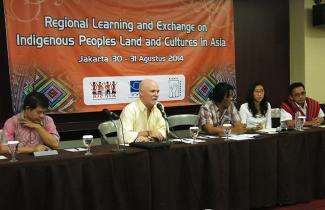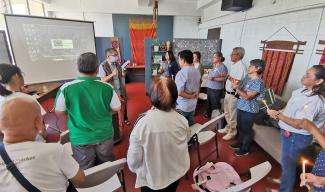Learning and Exchange on IP Land and Cultures in Asia
Posting Date
Some countries in Asia have advanced systems for indigenous peoples land rights mapping and registration (Philippines, Nepal, India). This is not very prevalent in other Asian countries. In most of these places indigenous peoples live in key forested areas that are automatically considered state land, even if claimed as indigenous territories. While efforts to ‘interface' rights occur, as in Indonesia, there emerges a parallel effort to inventory and identify of larger swaths of ecological landscapes.
These are now mandated under the Biodiversity Convention to develop clear parameters for indigenous occupants and their traditional knowledge and systems. The latter is much more acceptable within governments, earlier resistant to indigenous rights. Hence the advantage to discuss these land claims and registration within a cultural festival.
Asian IP's hope this evolves into a medium where exchanges, and field learning happens. It also hopes for the development of mapping network that will mediate capacity building, indigenous geospatial data collection, and updating mapping and registration strategies. It also hopes to ‘advance' strategies for use of maps for policy reform and realizing rights in countries with new or unimplemented reforms in coastal, forest and land tenure.
In relation to the above, 150 participants from Indigenous Peoples followed workshop “Regional Learning and Exchange on Indigenous Peoples Land and Cultures in Asia. This Workshop held on 30 - 31 August 2014 in Jakarta.
The objectives of the workshop are: Learning and Exchange: What does it take to have land rights recognition and land registration in our countries?, Setting up learning nodes for capacity building in legal and policy research and advocacy for customary land rights: Adat Land Mapping and Land Registration, Galvanize an ASIA or ASEAN wide level network for realizing IP rights.
These are now mandated under the Biodiversity Convention to develop clear parameters for indigenous occupants and their traditional knowledge and systems. The latter is much more acceptable within governments, earlier resistant to indigenous rights. Hence the advantage to discuss these land claims and registration within a cultural festival.
Asian IP's hope this evolves into a medium where exchanges, and field learning happens. It also hopes for the development of mapping network that will mediate capacity building, indigenous geospatial data collection, and updating mapping and registration strategies. It also hopes to ‘advance' strategies for use of maps for policy reform and realizing rights in countries with new or unimplemented reforms in coastal, forest and land tenure.
In relation to the above, 150 participants from Indigenous Peoples followed workshop “Regional Learning and Exchange on Indigenous Peoples Land and Cultures in Asia. This Workshop held on 30 - 31 August 2014 in Jakarta.
The objectives of the workshop are: Learning and Exchange: What does it take to have land rights recognition and land registration in our countries?, Setting up learning nodes for capacity building in legal and policy research and advocacy for customary land rights: Adat Land Mapping and Land Registration, Galvanize an ASIA or ASEAN wide level network for realizing IP rights.




